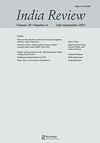Introduction to the Special Issue on ‘Chronicling the Histories of India: The Politics of Remembrance and Commemoration’
IF 0.6
3区 社会学
Q3 AREA STUDIES
引用次数: 0
Abstract
Postcolonialism has proven to be a fertile ground for interdisciplinary enquiries into the loci of power and agents of change. It has provoked intellectuals to ask probing questions about the exclusions, disparities and invisibilities they detect as pervading international politics, both elite and everyday. This sensibility has informed analyses that examined imperial associations with globalization, identity, memory, development, and indeed, with the international itself, among other issues. This distinctive aspect about its orientation—an abiding interest in drawing continuities between the past and the present—invariably brought historical depth into postcolonial formulations, even as these reopen history itself to critical scrutiny. In doing so, postcolonialism has prompted a richly textured engagement of International Relations (hereby IR) with history that has not only examined macro-historical processes but micro-histories as well. They bring out how elite politics intersected with the ordinary and the everyday, thereby constituting individual and collective memory. Postcolonial theory shared this emphasis on socially situated analysis with other post-positivist approaches in IR. From the 1980s onwards, and steadily picking up pace ever since, critical approaches such as non-Western IR, postmodernism and feminism have questioned structural power and the role IR as a discipline has played in legitimizing it. Consequently, we witness a continued engagement with issues concerning marginalized identities, structural violence and discriminatory practices. Such normative positioning has, expectedly, disturbed traditional typologies that inform order as we know it and which, willy-nilly, regard dominance to be a function of such order. Traditional IR’s preoccupation with great power politics, and the claims of Western scholarship to universality (and hence, to superiority) are regarded as reflecting this bias. Given how wary critical IR is of authoritative claims to (universal) truth, it is no surprise that it employs a diverse range of epistemes. Postcolonialism, in seeking to represent the unique historical experiences of the non-Western INDIA REVIEW 2021, VOL. 20, NO. 5, 483–496 https://doi.org/10.1080/14736489.2021.1996120“纪念印度历史:纪念和纪念的政治”特刊简介
后殖民主义已被证明是跨学科研究权力和变革推动者的沃土。它激发了知识分子们对他们发现的普遍存在于国际政治中的排斥、差异和隐形性提出探究性问题,无论是精英还是日常。这种敏感性为分析提供了依据,这些分析考察了帝国主义与全球化、身份认同、记忆、发展,甚至与国际本身以及其他问题的联系。其方向的这一独特方面——对在过去和现在之间画出连续性的持久兴趣——总是将历史深度带入后殖民的表述中,即使这些表述将历史本身重新置于批判性的审视之下。在这样做的过程中,后殖民主义促使国际关系(简称IR)与历史进行了丰富的接触,不仅考察了宏观历史过程,也考察了微观历史。它们揭示了精英政治如何与普通人和日常生活相交,从而构成了个人和集体的记忆。后殖民理论与IR中的其他后实证主义方法一样重视社会情境分析。从20世纪80年代开始,非西方IR、后现代主义和女权主义等批判方法一直在质疑结构权力以及IR作为一门学科在使其合法化方面所起的作用。因此,我们目睹了对边缘化身份、结构性暴力和歧视性做法等问题的持续参与。不出所料,这种规范定位扰乱了传统的类型学,这些类型学为我们所知的秩序提供信息,并且随意地将支配地位视为这种秩序的一种功能。传统的IR对大国政治的关注,以及西方学术界对普遍性(从而对优越性)的主张,都被认为反映了这种偏见。考虑到IR对(普遍)真理的权威主张是多么谨慎,它采用了各种各样的认识论也就不足为奇了。后殖民主义,在寻求代表《2021年非西方印度评论》的独特历史经历时,第20卷,第5期,483–496https://doi.org/10.1080/14736489.2021.1996120
本文章由计算机程序翻译,如有差异,请以英文原文为准。
求助全文
约1分钟内获得全文
求助全文

 求助内容:
求助内容: 应助结果提醒方式:
应助结果提醒方式:


